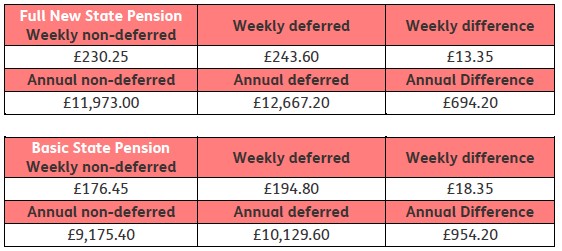Analysis by retirement specialist Just Group of recent data published by the Department for Work and Pensions1, reveals the very low awareness of the option available to people to defer the State Pension and receive a higher income later on.
Two-thirds (66%) of those aged 40-65 said that they were not aware of the option to delay taking the State Pension beyond the State Pension age. Of the 34% who did know they could delay, a third (33%) were unsure what the impact of deferring would be on their regular payments and an additional 8% either thought they would receive the same amount or less. The data also reveals low levels of people deferring the State Pension with only one in 10 (10%) adults aged 66-75 saying that they had delayed receipt of the State Pension.
When asked why they deferred the State Pension, the most popular options were either because people did not need financially to claim it as soon as they reached the State Pension age (49%) or because they were attracted to the higher income later (48%). A fifth (20%) also wanted to wait until they had stopped working before they claimed the State Pension.
People who reach State Pension age on or after 6 April 2016 receive the new State Pension. They can benefit from a 1% increase in their weekly State Pension for every nine weeks that payments are deferred, equivalent to around 5.8% extra income for every full year deferred.
With the triple lock boosting the new State Pension to £230.25 a week this year, those who defer their payments for the 2025/26 financial year will benefit from an extra £13.35 a week – which equates to an additional £694.20 of income every year for life (plus any inflation-linked increases).

Those who reached State Pension age before 6 April 2016 and chose to defer are treated more generously, with an extra 1% State Pension income for every five weeks deferred, equal to an annual rise of 10.4% or £954.20, which can be taken either as extra income or a lump sum.
Stephen Lowe, group communications director at Just Group, said: “Deferring your State Pension is effectively a trade-off between receiving your full State Pension payments today or an increased State Pension later. Delaying the State Pension may not work for everybody but it’s certainly an option worth knowing about and exploring in more detail for those people who don’t need the money immediately. If you’re still working, deferring could help reduce your income tax bill in the short term and boost your pension income in later years when it may be needed more.
“The decision requires careful thought. It takes around 17 years to break even if you defer the State Pension for a year so health and life expectancy are key considerations when weighing up whether you could benefit. Currently, any extra income accrued through deferring the State Pension offers protection against inflation – a valuable safeguard for those planning for a long retirement. Anyone who is unsure of their options can find further guidance from a range of sources. The Government’s free and impartial Pension Wise service is a good place to start while regulated financial advice remains the gold-standard.”
|

